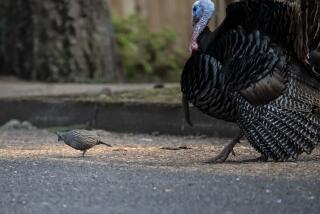The Pigeon Lady Mourns : Julie Garcia Cavorts With Birds at Newport Beach, Laments Their Being Trapped
- Share via
I’ve been stood up. This is what I’m thinking standing here in the rain, and the wind and way too early morning cold, like a lone kook staring into the surf at the Newport Beach pier, trampling the scene of the alleged crime, wishing I’d taken the time to eat breakfast after all.
The pelicans staked on the shore like signposts stare my way, blase. Yeah, just another soul-searcher out in the rain.
Then an older woman with that odd layered look to her clothing and too much weariness in her eyes pops her head out of the public restroom.
The eyes dart, sizing me up, and the look on her face mixes embarrassment with relief. She’d been washing up; she clutches a plastic bag stuffed with who knows what.
It is I who feels compelled to explain.
Yes, this woman has seen who I’m looking for. “She’s over there,” she tells me with a brush of her hand. “God bless you!” Then she’s gone too.
Julie Garcia could have waited, but her pigeons could not have.
The birds gather at 7 a.m., give or take, but not too much. Creatures of habit, Julie had told me, adding that the pigeons’ punctuality has contributed to their untimely demise.
Now it’s the birds that I see first, maybe 150 of them, brushing through the air, turning in unison as they follow Julie on the beach. She is running, playing, and the pigeons know the game.
She whistles, rocking slightly, and they come, suddenly stopped in flight, legs extended, coasting down. Between bites of pigeon feed, which Julie supplies, they perch on her arms, her shoulders, nuzzle the crooks of her arms, her neck.
I am thinking these are not like many pigeons that I have known. These pigeons kiss, suckers for love.
And the trappers have figured that out.
Just last month, one came down to the beach about this time, during the week that Julie, a medical lab technician, was starting a new job. Julie figures that he knew , or guessed when she missed a few days in a row.
Early-morning seminars that week meant that she couldn’t make the drive down from Whittier, which she does most every day since moving from Newport Beach nine months ago.
Julie says the trapper made off with about 400 birds--her birds, many banded and trained, including Caspar and Houdini and Poky--then sold them to a middle-man in Riverside. He sells them to gun clubs, as live targets and to teach dogs to retrieve.
When Julie came back to the pier, only 14 pigeons were left.
“My heart hit the pit of my stomach. I felt nauseous. I felt sick to my stomach. It took me two days before I could actually cry. It is really hard.”
“Just imagine if you lost your cat,” she tells me now that we’re sitting in a coffee shop and out of the rain. “It is really hard.”
Tears are rimming Julie’s eyes and she pulls out her photographs, IDing each bird by name and the story of its life.
“This one was Poe,” she says. “He was unconscious for three days and I read Edgar Allen Poe to him during his recovery.”
She pauses, then lapses into the third person. “Yeah, she is a little nuts. Just a little.”
But Julie’s not sure that she wants to do this. Break down, that is, really show me how much these birds mean to her. They mean the world.
She doesn’t want to appear like a fruitcake, even after I told her that I’m a fruitcake for my two cats. She worries that acting like an extremist will give officialdom even more reason to just blow her off.
She wants to emphasis how wrong it is of the city to allow her birds to be trapped.
(The city of Laguna Beach, for example, strictly forbids trapping pigeons or any other bird. The city’s status as a bird sanctuary covers that.)
But here’s what the city of Newport Beach says to anyone who feels inclined to trap pigeons within the city’s bounds: Go ahead.
Sgt. Andy Gonis, the spokesman for the city’s police, which has jurisdiction over animal control, says that after a trapper took pigeons from the pier last May, the city told him after the fact that he should have had a business license.
Gonis says the city also called the U.S. Fish and Wildlife Service and found out that pigeons have no legal protection. Additionally, Gonis says that it appears the pigeons were trapped “in a humane way.”
You can imagine how all this sits with Julie. Sometimes, it seems too much.
“Everybody tells me, ‘Julie, you’re making yourself sick. Just let it go.’ And I’ve said a million times, ‘That’s it. I can’t take this anymore. I can’t take the hurt.’ But then when I came back that day after the trapping there were those 14 birds waiting for me, like ‘Come on, let’s go!’
“And to see all the kids come down and hold these birds. They squeal with delight. I can’t stop that. And I’ve had some of the nicest letters from people . . . .But all it takes is a couple of disgruntled people.”
So Julie is trying, as best she can, to be rational about all this. She points out that, thanks to her, the pigeons now hang out on the beach instead of the parking lot at the pier.
And she says that she even sent the city a Humane Society study that found that for every adult pigeon removed, two squabs come in to replace it.
This is how she explains how the pier pigeon population has jumped from only 14 to the current 150 or so in only a month. Some of the new arrivals are really old-timers, she says. She’s recognized their bands as hers, from years before.
Julie, who is single and 39, has been in the unofficial (and unpaid) pigeon rescue and care-taking business for six years.
By the time we’re through talking, I have a new understanding of these birds. After Julie drives off, I take another walk in the rain on the beach.
There are some pigeons, hunkered down in the sand. I suppose they’re waiting for tomorrow morning, when they can fly with Julie again.
More to Read
Sign up for Essential California
The most important California stories and recommendations in your inbox every morning.
You may occasionally receive promotional content from the Los Angeles Times.










